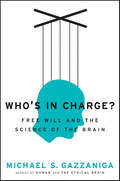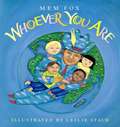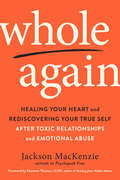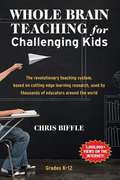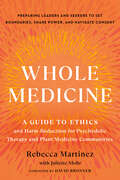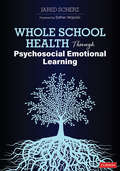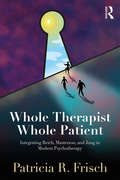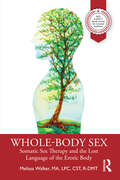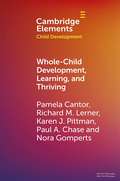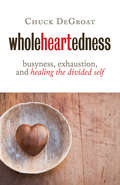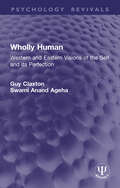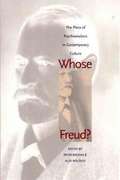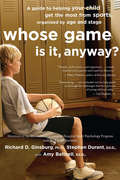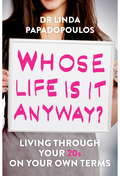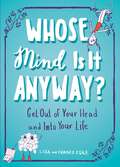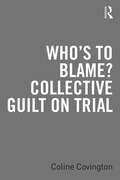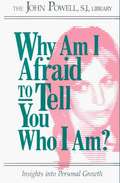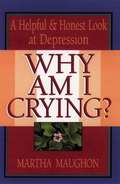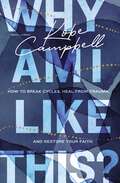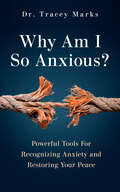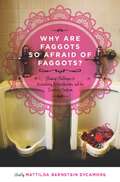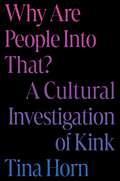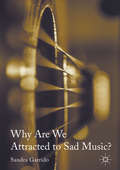- Table View
- List View
Who's in Charge?: Free Will and the Science of the Brain
by Michael S. Gazzaniga“Big questions are Gazzaniga’s stock in trade.”—New York Times“Gazzaniga is one of the most brilliant experimental neuroscientists in the world.”—Tom Wolfe“Gazzaniga stands as a giant among neuroscientists, for both the quality of his research and his ability to communicate it to a general public with infectious enthusiasm.”—Robert Bazell, Chief Science Correspondent, NBC News The author of Human, Michael S. Gazzaniga has been called the “father of cognitive neuroscience.” In his remarkable book, Who’s in Charge?, he makes a powerful and provocative argument that counters the common wisdom that our lives are wholly determined by physical processes we cannot control. His well-reasoned case against the idea that we live in a “determined” world is fascinating and liberating, solidifying his place among the likes of Oliver Sacks, Antonio Damasio, V.S. Ramachandran, and other bestselling science authors exploring the mysteries of the human brain.
Whoever You Are
by Mem FoxEvery day all over the world, children are laughing and crying, playing and learning, eating and sleeping. They may not look the same. They may not speak the same language. Their lives may be quite different. But inside, they are all alike. Stirring words and bold paintings weave their way around our earth, across cultures and generations. At a time when, unfortunately, the lessons of tolerance still need to be learned, Whoever You Are urges us to accept our differences, to recognize our similarities, and--most importantly--to rejoice in both.
Whole Again: Healing Your Heart and Rediscovering Your True Self After Toxic Relationships and Emotional Abuse
by Jackson MacKenzie Shannon ThomasFrom a leading voice on recovering from toxic relationships, a deeply insightful guide to getting back to your "old self" again--in order to truly heal and move on.Jackson MacKenzie has helped millions of people in their struggle to understand the experience of toxic relationships. His first book, Psychopath Free, explained how to identify and survive the immediate situation. In this highly anticipated new book, he guides readers on what to do next--how to fully heal from abuse in order to find love and acceptance for the self and others.Through his close work with--and deep connection to--thousands of survivors of abusive relationships Jackson discovered that most survivors have symptoms of trauma long after the relationship is over. These range from feelings of numbness and emptiness to depression, perfectionism, substance abuse, and many more. But he’s also found that it is possible to work through these symptoms and find love on the other side, and this book shows how. Through a practice of mindfulness, introspection, and exercises using specific tools, readers learn to identify the protective self they've developed - and uncover the core self, so that they can finally move on to live a full and authentic life--to once again feel light, free, and whole, and ready to love again. This book addresses and provides crucial guidance on topics and conditions like: complex PTSD, Narcissistic abuse, Avoidant Personality Disorder, Codependency, Core wounding, toxic shame, Borderline Personality Disorder, and so many more. Whole Again offers hope and multiple strategies to anyone who has survived a toxic relationship, as well as anyone suffering the effects of a breakup involving lying, cheating and other forms of abuse--to release old wounds and safely let the love back inside where it belongs.
Whole Brain Teaching for Challenging Kids (and the Rest of Your Class, Too!)
by Chris BiffleWhole Brain Teaching, a grass roots, education reform movement, begun in 1999 by three Southern California teachers, has attracted an astonishing following among educators across the U.S. and in 30 foreign countries. Based on cutting edge scientific research, Whole Brain Teaching recognizes that students learn the most when they are engaged in lessons that involve seeing, hearing, doing, speaking and feeling. Join the revolution! Transform your students from passive receivers of information to dynamic creators of high energy lessons.
Whole Medicine: A Guide to Ethics and Harm-Reduction for Psychedelic Therapy and Plant Medicine Communities
by Rebecca MartinezA comprehensive framework for ethical psychedelic medicine—a guide for therapists, trip sitters, and anyone concerned about upholding boundaries and safety in the entheogen and plant medicine communityPsychedelic advisor Rebecca Martinez lays out the groundwork for an ethical approach to 21st-century psychedelic therapy. Applying a social-justice lens to entheogenic practice, Martinez provides practical guidance for psychedelic sitters, advocates, explorers, and those practicing (or learning to practice) licensed psychedelic therapy.As psychedelics become a more accessible pathway to healing, how do practitioners—and seekers—navigate complex issues in a wide range of settings? Here, you&’ll learn skills like:Understanding consent and boundariesBuilding safe and ethical psychedelic experiencesHow to integrate the cultural and historical contexts of plant medicinesConsidering the psychological risks and benefits of psychedelic therapyHow to apply a social-justice lens to entheogenic healingMartinez also discusses how, in many corners of the psychedelic community, an overemphasis on positivity can overwhelm attempts to challenge abuses of power; dismantle internalized hierarchies; and acknowledge and integrate our own flaws and traumas.An essential guide for any psychedelic therapist, entheogenic guide, or mind-expanding medicine enthusiast, Whole Medicine brings much-needed conversations about ethics, boundaries, and informed use out of the shadows for better, safer, community-centered psychedelic healing.
Whole School Health Through Psychosocial Emotional Learning
by Jared Scherz15 strategies to jumpstart student and educator health With rapid technological advancements and changes to how schools must respond to learning and mental health needs, the educational landscape looks considerably different from how it did 20 years ago. How do educators contend with this everchanging future? Jared Scherz answers this question and more by outlining the 15 critical steps to educators’ and students’ health through psychosocial emotional learning. Designed for everyone involved in the educational system—including district administrators, teachers, students, parents, and the business community—this book provides a practical plan with steps to harmonize whole-school health, including sustainable growth in student character development, improvement of organizational health, and reduction of violence and other threats to education. A blueprint of applicable resources is provided, including: • 15 easy-to-follow guidelines for successfully implementing social-emotional learning practices • A spotlight on issues such as empathy, identity formation, self-control, and conflict resolution • Dozens of real-world stories from educators • Anecdotal and data-driven results from successful implementation Educators today must navigate a newer and more dynamic terrain than previous generations. This book provides a practical framework for improving the satisfaction of educators, all through the lens of whole-school health.
Whole School Health Through Psychosocial Emotional Learning
by Jared Scherz15 strategies to jumpstart student and educator health With rapid technological advancements and changes to how schools must respond to learning and mental health needs, the educational landscape looks considerably different from how it did 20 years ago. How do educators contend with this everchanging future? Jared Scherz answers this question and more by outlining the 15 critical steps to educators’ and students’ health through psychosocial emotional learning. Designed for everyone involved in the educational system—including district administrators, teachers, students, parents, and the business community—this book provides a practical plan with steps to harmonize whole-school health, including sustainable growth in student character development, improvement of organizational health, and reduction of violence and other threats to education. A blueprint of applicable resources is provided, including: • 15 easy-to-follow guidelines for successfully implementing social-emotional learning practices • A spotlight on issues such as empathy, identity formation, self-control, and conflict resolution • Dozens of real-world stories from educators • Anecdotal and data-driven results from successful implementation Educators today must navigate a newer and more dynamic terrain than previous generations. This book provides a practical framework for improving the satisfaction of educators, all through the lens of whole-school health.
Whole Therapist, Whole Patient: Integrating Reich, Masterson, and Jung in Modern Psychotherapy
by Patricia R. FrischIntegrating the work of Reich, Masterson, and Jung, Whole Therapist, Whole Patient is a step-by-step guidebook for professionals to learn about the psychology of their patients and conduct treatment in a dynamic way. This text combines Reich’s character analyses, Masterson’s work on personality disorders, and Jung’s dream analyses to create a clear typology of character types that therapists can use to understand themselves and their patients. Also included are case management techniques and guidance for working with difficult patients. In addition, readers can turn to the book’s online resources to access a downloadable patient package, case presentation guide, and psychological history form.
Whole-Body Sex: Somatic Sex Therapy and the Lost Language of the Erotic Body
by Melissa WalkerWeaving together somatic psychotherapy, dance/movement therapy, and sex therapy approaches, this uniquely interdisciplinary and practical book offers guidance on how to strengthen your connection with pleasure, receptivity, and ecstasy in an embodied way. Melissa Walker contextualizes the erotic body as being embedded in a sex-negative culture. Taking an experiential somatic approach, this book helps readers map the erotic self to establish a whole-body sexuality, becoming an important sexuality ally in a larger social movement toward erotic inclusiveness. This ground-breaking text illuminates how to shed the harmful messages that an individual has internalized about their sexuality, to learn the language of their somatic self, and begin to build a whole-body appreciation for their creative potential. Filled with questions, guided experientials, and map-building practices that help readers learn more about themselves, this book is essential reading for sex therapists to navigate the vast map of sexuality to create true health and sexual evolution.
Whole-Child Development, Learning, and Thriving: A Dynamic Systems Approach (Elements in Child Development)
by Richard M. Lerner Pamela Cantor Karen J. Pittman Paul A. Chase Nora GompertsWe discuss whole-child development, learning, and thriving through a dynamic systems theory lens that focuses on the United States and includes an analysis of historical challenges in the American public education system, including inequitable resources, opportunities, and outcomes. To transform US education systems, developmental and learning scientists, educators, policymakers, parents, and communities must apply the knowledge they have today to 1. challenge the assumptions and goals that drove the design of the current US education system, 2. articulate a revised, comprehensive definition of whole-child development, learning, and thriving that accepts rather than simplifies how human beings develop, 3. create a profound paradigm shift in how the purpose of education is described in the context of social, cultural, and political forces, including the impacts of race, privilege, and bias and 4. describe a new dynamic 'language' for measurement of both the academic competencies and the full set of 21st century skills.
Wholeheartedness: Busyness, Exhaustion, and Healing the Divided Self
by Chuck DeGroatI&’m being pulled in a thousand different directions. As a therapist, Chuck DeGroat hears that line all the time. &“I hear it from students and software developers,&” he says. &“I hear it from spiritual leaders and coffee baristas. And I hear it from my own inner self.&” We all feel that nasty pull to and fro, the frantic busyness that exhausts us and threatens to undo us. And we all think we know the solution — more downtime, more relaxation, more rest. And we&’re all wrong. As DeGroat himself has discovered, the real solution to what pulls us apart is wholeheartedness, a way of living and being that can transform us from the inside out. And that&’s what readers of this book will discover too.
Wholeheartedness: Busyness, Exhaustion, and Healing the Divided Self
by Chuck DeGroatI’m being pulled in a thousand different directions. As a therapist, Chuck DeGroat hears that line all the time. “I hear it from students and software developers,” he says. “I hear it from spiritual leaders and coffee baristas. And I hear it from my own inner self.” We all feel that nasty pull to and fro, the frantic busyness that exhausts us and threatens to undo us. And we all think we know the solution — more downtime, more relaxation, more rest. And we’re all wrong. As DeGroat himself has discovered, the real solution to what pulls us apart is wholeheartedness, a way of living and being that can transform us from the inside out. And that’s what readers of this book will discover too.
Wholly Human: Western and Eastern Visions of the Self and its Perfection (Psychology Revivals)
by Guy Claxton Swami Anand AgehaOriginally published in 1981, the subject matter of Wholly Human is integrated Man, the man whose functions and faculties work together in harmony, the man who is wholly human – aware and accepting of the disparities between who he thinks he is and who he really is.In the first part of this book the author looks at the different ways in which we lose sight of our wholeness, as well as therapies and techniques for reintegration available at the time. In the second part he looks at the ways in which integrated man perceives and acts once he has seen through the fallacious ideas he has been given about himself. In order to explain the nature of integrity the author develops an integrated approach to psychology. He combines the practical and psychological wisdom of the East with contemporary Western theories of the Self.Written in a lively and engaging style, the book will be of interest not only to psychologists but to all those who have asked themselves that most slippery of questions: Who am I? The author is uniquely equipped to guide the reader on this voyage of self-discovery. Having immersed himself both in theoretical psychology and in the first-hand experience of many therapeutic and meditative techniques, he writes with an authority that is at once intellectual and existential.
Whose Freud? The Place of Psychoanalysis in Contemporary Culture
by Alex Woloch Peter BrooksFeatures contributors, Judith Butler, Frederick Crews, Leo Bersani, Juliet Mitchell, Robert Jay Lifton, Richard Wollheim and other theorists from such fields as literature, philosophy, film, history, cultural studies, neuroscience, psychotherapy. Under discussion in all these articles is whether Freud is still relevant, specifically whether psychoanalysis is still a valid theory of mind, if its therapeutic applications have been rendered obsolete by drugs, how psychoanalysis still figures in debates about sexual identity despite its rejection by many feminists, and how Freud's work still contributes to cultural analysis. The editor's conclusion is that Freud is not only still relevant but the "presiding genius of our culture and the author of its symptomatic illnesses. " Papers were delivered in a 1998 symposium at Yale, the locale from which Freud launched his original invasion of the US psyche nearly a century before.
Whose Game Is It, Anyway?: A Guide to Helping Your Child Get the Most from Sports, Organized by Age and Stage
by Amy Baltzell Richard D. Ginsburg Stephen DurantIn an era when parents and kids are overwhelmed by a sports-crazed, win-at-all-costs culture, here is a comprehensive guide that helps parents ensure a positive sports experience for their children. In Whose Game Is It, Anyway? two of the country’s leading youth sports psychologists team up with a former Olympic athlete and expert on performance enhancement to share what they have gleaned in more than forty years of combined experience.The result is a book unique in its message, format, and scope.Through moving case studies and thoughtful analyses, Ginsburg, Durant, and Baltzell advocate a preventive approach through a simple three-step program: know yourself, know your child, know the environment.They look at children in age groups, identifying the physical, psychological, and emotional issues unique to each group and clarifying what parents can expect from and desire for their kids at every stage.They also explore myriad relevant topics, including parental pressure, losing teams, steroid use, the overscheduled child, and much more.Illuminating, impassioned, and inspiring, Whose Game Is It, Anyway?is required reading for anyone raising—or educating—a child who participates in sports.
Whose Life Is It Anyway?: Living Life on Your Own Terms
by Dr Linda PapadopoulosLife is full of opportunity for 20-somethings, but it's also far more pressured than ever before. Whether it's the proliferation or the homogeneity of images of beauty and success that wallpaper our world, we know what a beautiful woman looks like - and we know what a perfect life looks like too. We live in a world that floods us with expectations about everything - from what we should weigh to what we should wear to how often we should be having sex and how much money we should be making. As a consequence, we begin to feel that we need to tick all these boxes in order to have 'the Perfect Life'. When we inevitably fall short, we feel anxious - we feel that we are failing and have the sense we are losing control. As a result, increasing numbers of young women are battling with issues such as anxiety, low self-esteem, bullying, perfectionism, toxic friendships and relationships, pressure to succeed or conform, and poor body image. At an age when life should be exciting, fun and relatively care-free, more and more young women are adrift and struggling. Dr Linda Papadopoulos understands the issues and has the experience to guide and support young women to help get their lives back on track so they can feel happier, more confident, more in control. Whose Life Is It Anyway? offers valuable insight and practical self-help to empower women to throw off the burden of expectation and start leading the lives they want to lead.
Whose Mind Is It Anyway?: Get Out of Your Head and Into Your Life
by Lisa Esile Franco EsileA sympathetic illustrated guide to learning to live with your mind--even when it tries to trick you.Most of us spend our lives trailing after our minds, allowing our brains to take us in directions that are safe and secure, controlled and conformed. Your mind doesn't want you to take that new job, sign up for that pottery class, or ask someone out. It wants you to stay unemployed, unfulfilled, and single because it enjoys routine and is resistant to change, no matter how positive the change may be. But more often than not, that's not what you want. Whose Mind Is It Anyway? will help you learn how to separate what you want from what your brain wants and how to do less when your mind is trying to trick you into doing more. In a colorful, funny, and nonthreatening way, it answers the difficult question of how we can take control of our self-defeating behaviors. Filled with charming illustrations, this book will be the friendly voice in your head to counter your negative thoughts, and it will teach you how to finally be at peace with all that you are.
Who’s to Blame? Collective Guilt on Trial
by Coline CovingtonWho’s to Blame? Collective Guilt on Trial presents a psychoanalytic exploration of blame and collective guilt in the aftermath of large-scale atrocities that cause widespread trauma and victimization. Coline Covington explores various aspects of social and collective guilt and considers how both perpetrators and victims make sense of their experiences, with particular reference to group behavior and political morality. Covington challenges the concept of collective guilt associated with the aftermath of large-scale atrocities such as the Holocaust and examines the moral pressure placed on perpetrators to exhibit guilt as part of a realignment of political power and a process of restoring social morality. Who’s to Blame? Collective Guilt on Trial concludes with a chapter-length case study examining Russia’s war in Ukraine. Combining psychoanalytic ideas with political, philosophical and social theory, Who’s to Blame? Collective Guilt on Trial will be of great value to readers interested in questions of collective guilt, blame and the possibilities of atonement. It will also appeal to psychoanalysts in practice and in training, and to academics of psychoanalytic studies, political philosophy, sociology and conflict resolution.
Why Am I Afraid to Tell You Who I am?
by John PowellThere are many reasons for being afraid to tell others who we really are. We're often taught to put on an act when around other people. This book shows you how you can overcome the fear of revealing your true self to others.
Why Am I Crying?: A Helpful & Honest Look at Depression
by Martha MaughonAn honest, helpful, I-have-been-there look at depression. Martha Maughon writes encouragingly of God's grace and human weakness.
Why Am I Like This?: How to Break Cycles, Heal from Trauma, and Restore Your Faith
by Kobe CampbellWhy does our past pain continue to affect our present?Though many of us can point to patterns of brokenness in our lives, we don&’t know why they're there. No matter how hard we work, we can&’t seem to outrun the very things that break our hearts. That's because our everyday setbacks are rooted in our unaddressed wounds.In Why Am I Like This? seminary-trained, licensed trauma therapist Kobe Campbell helps us understand why it&’s so hard to break these patterns as she offers us a deeper understanding of how our past shapes our present. With tender wisdom, rare vulnerability, and profound honesty, Kobe reminds each reader that they&’re not alone, empowering them to step into healing with evidence-based, faith-filled coping skills and resources.In Why Am I Like This?, you will:gain an understanding of what trauma and healing really are,explore the roots of your dysfunctional patterns,learn how your trauma shows up in your everyday life, andfind trauma-informed, faith-based coping mechanisms to heal your mind and deepen your intimacy with God.Kobe marries theological insight with therapeutic principles to give readers the tools and insights needed to begin their journey of restoration.
Why Am I So Anxious?: Powerful Tools for Recognizing Anxiety and Restoring Your Peace
by Tracey MarksA practical guide from respected therapist and popular YouTube star Dr. Tracey Marks that will help readers recognize the common signs and symptoms of anxiety and anxiety-related mood disorders, and then help them develop coping skills using self-guided solutions or help them decide on other treatment options.Take control of your anxiety and take back your life!Anxiety seems to be everywhere in today's world. But how do you know if you're experiencing anxiety, or something else? And what can you do to fix it? Renowned therapist and YouTube star Dr. Tracey Marks is known for her friendly, relatable style that helps followers of her YouTube channel recogize what's bothering them and then guides them to practical solutions that will help them manage their mental health issues. In Why Am I So Anxious?, Dr. Marks' will help you understand many of the most common sources of anxiety, help you identify what type of anxiety you may be experiencing, and give you helpful insight on how you can self-manage your anxiety before deciding if additional treatment options are the best choice. You don't need to let anxiety control your life!Here's what you'll find inside:- Detailed explanations for many of the most common anxiety disorders people struggle with in today's times, all written in Dr. Marks' soothing and relatable style- Tips for managing mild to moderate anxiety, with recommendations that go beyond just therapy and medication and help eader decide what treatment option is best for them- Helpful guidance for recognizing and preventing situations where anxiety may be triggered- Simple exercises that will help readers recognize their symptoms and triggers, so they can better manage their anxiety
Why Are Faggots So Afraid of Faggots?: Flaming Challenges to Masculinity, Objectification, and the Desire to Conform
by Mattilda Bernstein SycamoreGay culture has become a nightmare of consumerism, whether it's an endless quest for Absolut vodka, Diesel jeans, rainbow Hummers, pec implants, or Pottery Barn. Whatever happened to sexual flamboyance and gender liberation, an end to marriage, the military, and the nuclear family? As backrooms are shut down to make way for wedding vows, and gay sexual culture morphs into "straight-acting dudes hangin' out," what are the possibilities for a defiant faggotry that challenges the assimilationist norms of a corporate-cozy lifestyle? Why Are Faggots So Afraid of Faggots? challenges not just the violence of straight homophobia but the hypocrisy of mainstream gay norms that say the only way to stay safe is to act straight: get married, join the military, adopt kids! Mattilda Bernstein Sycamore reinvokes the anger, flamboyance, and subversion once thriving in gay subcultures in order to create something dangerous and lovely: an exploration of the perils of assimilation; a call for accountability; a vision for change. A sassy and splintering emergency intervention! Called "startlingly bold and provocative" by Howard Zinn, and described as "a cross between Tinkerbell and a honky Malcolm X with a queer agenda" by The Austin Chronicle, Mattilda Bernstein Sycamore is undoubtedly one of America's most outspoken queer critics. She is the author of two novels, including, most recently, So Many Ways to Sleep Badly, and is the editor of four nonfiction anthologies, including Nobody Passes: Rejecting the Rules of Gender and Conformity and That's Revolting! Queer Strategies for Resisting Assimilation.
Why Are People Into That?: A Cultural Investigation of Kink
by Tina HornFrom a #1 Apple podcast host, Lambda Literary fellow, and dominatrix comes a sex-positive, judgment-free cultural deep-dive into the world of kink. When celebrated BDSM educator Tina Horn first launched Why Are People Into That?!, publications from Vice to Buzzfeed heralded it as one of the best sex podcasts around. Each episode centered around a different fetish or fantasy, thoughtfully examining why, exactly, different strokes work for different folks. From sex workers and scientists to artists and activists, Tina&’s wide range of guests helped educate fascinated listeners across the world on the wide spectrum of humanity&’s appetites. With her listeners growing more and more insatiable, she soon realized that the only way to address the titular question with all the depth and nuance it deserved was to turn that idea into a book. From spanking, strap-ons, and sluts, to taboos involving cake, chains, and cannibalism, WHY ARE PEOPLE INTO THAT? explores the universal drives that shape even the most specific erotic tastes, and the cultural context that molds and is molded by the way we conceptualize pleasure, gender, fantasy, and power. With buoyant prose, Tina invites us to reconsider everything we thought we knew about sexuality. How, for example, should we think about "consensual nonconsent" in a post-#MeToo era? How does cross-dressing fit in with our evolving cultural understanding of gender performance and identity? And what do foot fetishists, fisters, and FinDoms have in common? Blending insightful cultural criticism, investigative journalism, and spicy anecdotes from Tina&’s 15+ years of hard-earned expertise in the sex industry and beyond, WHY ARE PEOPLE INTO THAT? is a philosophical-but-fun exploration of the prismatic spectrum of human desire and the expansive possibilities of pleasure. For fans of adrienne maree brown and Emily Nagoski, this raunchy and rousing book is perfect for anyone who is interested not only in the intricacies of what we desire, but in how desire itself really works.
Why Are We Attracted to Sad Music?
by Sandra GarridoIn this book, perspectives in psychology, aesthetics, history and philosophy are drawn upon to survey the value given to sad music by human societies throughout history and today. Why do we love listening to music that makes us cry? This mystery has puzzled philosophers for centuries and tends to defy traditional models of emotions. Sandra Garrido presents empirical research that illuminates the psychological and contextual variables that influence our experience of sad music, its impact on our mood and mental health, and its usefulness in coping with heartbreak and grief. By means of real-life examples, this book uses applied music psychology to demonstrate the implications of recent research for the use of music in health-care and for wellbeing in everyday life.
